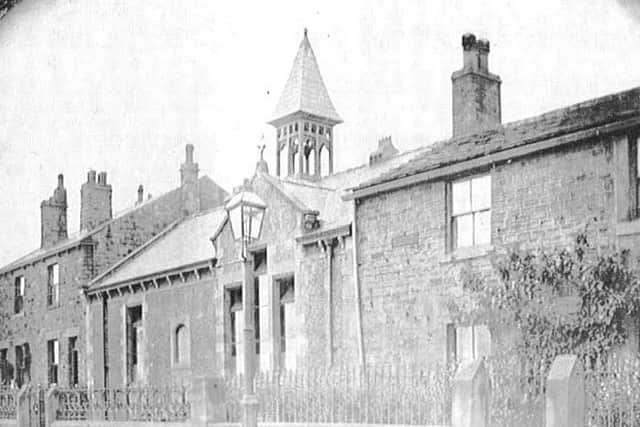The Nostalgia Column with Margaret Watson


This week I am writing about other benefactors who left money for a similar cause – but this time for the poor of Thornhill.
Richard Walker in 1812 bequeathed land, houses and money to set up a charity to provide a free school to educate poor children in Thornhill.
Advertisement
Hide AdAdvertisement
Hide AdThis was in the days when there was no such thing as free education, so if parents wanted their children to be educated they had to pay for it.


Many children from the working classes received no education, apart from Sunday School, because they were too poor to pay school fees.
If you look at old legal documents and marriage certificates today you will see that many of our ancestors couldn’t even write their own names and had to mark them with an X.
People like Richard Walker saw the injustice of this state of affairs and left instructions that his money would go to the building of a school for such people.
Advertisement
Hide AdAdvertisement
Hide AdThe terms of a curiously worded document in relation to Richard’s will states that certain houses and lands in his ownership be sold upon trust, to enable him to have erected a charity day school – with house, and offices for the resident schoolmaster.
The building was to be used as a free school for the instruction of children of both sexes of “industrious parents” resident within the parish of Thornhill, in reading, writing and arithmetic .
The schoolmaster was to live rent free with the rents and profits being derived from the trust to pay his salary and provide desks for the scholars.
In 1827, the income of the trust was £47 a year, the schoolmaster’s salary £40 a year, and the trust was to be administered by trustees including the Rector of Thornhill.
Advertisement
Hide AdAdvertisement
Hide AdRichard Walker also bequeathed £100 to be paid to the master of the day school to teach in the Sunday School.
The free school was duly built and became known as the Walker Welfare Free School which over the years would educate thousands of children from the village.
Times change, and eventually education became free to all, and the Walker Welfare School was no longer needed.
But that wasn’t to be the end of the usefulness of this historic building for it was converted into a much-loved community centre which also served the senior citizens of Thornhill.
Advertisement
Hide AdAdvertisement
Hide AdSadly, this historic building was demolished five years ago after the trustees – Kirklees Council – discovered it was unsafe.
Today, those Thornhill residents who had fought to save it are now fighting to ensure the name of Richard Walker and other benefactors from Thornhill are not forgotten.
They hope to erect a memorial on the site of the school in memory of them all and are being supported in this by their local councillors.
It is their wish that at least something positive will come out of the heartache felt by so many in Thornhill at the loss of this much loved building.
Advertisement
Hide AdAdvertisement
Hide AdThe community group which has been formed to do this, held a meeting this week to discuss their plans and to get other villagers involved.
Unfortunately, I was unable to go to the meeting but have promised that this column will be open to them for any publicity they may need to promote what they are doing.
The bequests made to Thornhill over the years were many and varied and were merged into one trust – Thornhill’s Poor Estate Charity.
Together, these charities provided sustenance, education and spiritual food for the poor of the village.
Advertisement
Hide AdAdvertisement
Hide AdThis charity was founded in 1688 when Richard Swallow, bequeathed “£100 to the poor of the ancient township of Thornhill”, which included at the time, Flockton, Netherton, Middlestown and Whitley Lower.
In 1713 land was purchased with the income held in trust for the poor of Thornhill, and part of this was Manor Farm at Whitley Bridge between Doncaster and Selby.
This farm may still give an income to the charity because I know it was in 2005.
In 1890 a number of smaller charities, all formed for the benefit of the poor of Thornhill, were combined into the Thornhill Poor Estate Charity.
Advertisement
Hide AdAdvertisement
Hide AdThe benefits from these charities were many and varied with some giving prayer books at Christmas and others giving doles or grants.
One bequest gave ten shilling to the Rector of Thornhill for his sermon on St Thomas’s Day.
In 1896, the Rector of Thornhill distributed doles to 67 poor persons ranging from 2/6d to six shillings.
In the 1920s, the charity commissioners agreed that the grants could be given to old people’s organisations in the relevant areas.
Advertisement
Hide AdAdvertisement
Hide AdIn 1975, the trustees gave out £200 in grants but in 2005, the grants given out had shot up to £5,000. Obviously, there were still many worthy causes seeking help.
There is much more I can write about Richard Walker’s will and the wills of other benefactors, but space this week does not allow it.
I will, however, try to include more about them in future columns.
Email [email protected] with your fond memories of Dewsbury and Batley.